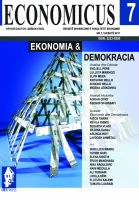“Depresioni i madh” i kapitalizmit liberal: 1929-33. Një analizë retrospektive
“The major depression” of liberal capitalism 1929-33: A retrospective analysis
Author(s): Adrian CIVICISubject(s): National Economy, Political history, Social history, Interwar Period (1920 - 1939)
Published by: Shtëpia botuese “UET Press”
Keywords: The major depression of liberal capitalism 1929-33; A retrospective analysis;
Summary/Abstract: The crisis of 1929 is the firs major shock of capitalism and covers the period from October 1929 until the beginning of World War II. It was a typical Stock Exhange crisis that erupted in the Stok Exhange of New- York between 24 to 29 October 1929 and gradually, over the next two years, spanned almost the whole world. This event marked the beginning of «major depression» which quickly became the biggest economik crisis of the twentieth century. The days of the onset of the crisis were called “Black Thursday of October 24”, “Black Monday of October 28” and “Black Tuesday of October 29”. History of Economy and Finance had not known and does not know any such cynical and negative case like that. Based on the economic consequences (discounts, bank and business failures, reduced consumption, overproduction crisis, currency invalidation, extraordinary unemployment, etc.) and political consequences (extinction political regimes such as the Republic of Waimar in Germany, strengthening of the Nazi Fascist dictatorships and many other authoritarian regimes such as in Spain, Portugal, Uruguay, etc) it was the most shocking event, which passed the world in the period between two world wars.
Journal: ECONOMICUS
- Issue Year: 7/2011
- Issue No: 1
- Page Range: 63-71
- Page Count: 9
- Language: Albanian

